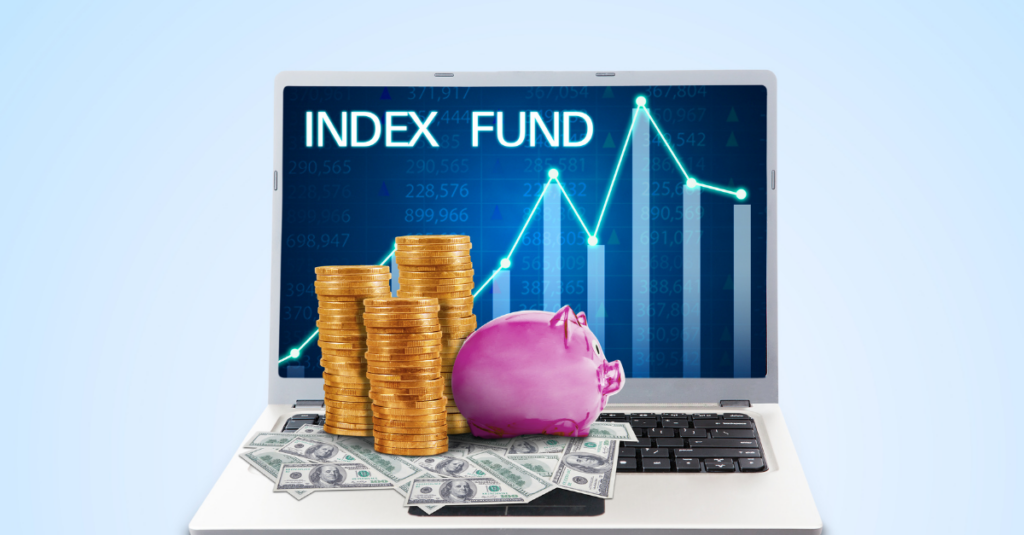Key Points:
Index funds allow investors to achieve instant diversification across hundreds of companies.
A passive investing approach reduces the need for complex financial analysis.
You can choose funds that support companies that share your personal values, allowing you to grow your money while also supporting the causes you care about most.
Q&A with Chelsea Ransom-Cooper, CFP®
Chelsea Ransom-Cooper, CFP®, is a Managing Partner at Zenith Wealth Partners, Founder of Women With Equity, and one of the Association of African American Financial Advisors (Quad A) 50 Under 50 financial professionals.
With more than a decade of experience advising wealthy retirees, individuals, families and businesses, let’s just say she knows a thing or two about the risks, value and strategy behind index funds!
Q: Why are Index Funds so popular amongst beginning investors?
Chelsea: You have two choices as stock investors –
- You can purchase a single stock, or
- You can purchase an ETF based on the S&P 500 that will give you exposure to hundreds of the largest companies in the US.
For investors who choose to purchase single stock, investing can become a full time job. The reason is, you have to make sure your portfolio is aligned with your goals, risk tolerance, financial needs, and your investment thesis.
For example, the S&P 500 gained 28.7% in 2021, while companies like Microsoft were up roughly 52% and Disney was down roughly 14%. If I had Microsoft and Disney in my investment portfolio, I would read their annual filing and quarterly earnings report to ensure their growth expectations align with my goals for my portfolio.
Reading these reports requires financial analysis, calculations and decoding financial jargon. The amount of research this entails can feel overwhelming to beginning investors.
When I talk to individuals who do not have the patience or the desire to participate in this level of research, I recommend they look into a hands-off investing strategy.
For beginner investors, hands-off investing is the simplest way to start.

Q: In which type of investment account should you hold Index Funds?
Chelsea: Are you maximizing your retirement contributions?
Depending on your income, you may want to start investing with a tax-advantaged retirement account such as a Roth IRA.
If you’ve already exhausted your retirement options, then consider opening a taxable investment account.
If you already have index funds in mind or if you want to pick your own, you can get started opening your accounts at a custodian like Charles Schwab, Vanguard, or Fidelity. I personally really enjoy Fidelity’s platform since you can research and compare multiple ETFs at once.
If you want to have a more automated approach, consider opening an account at a Robo Advisor like Betterment, Wealthfront, or Ellevest.
Q: What costs should someone consider before they invest index funds?
Chelsea: Index fund investing can minimize your transaction costs.
For almost every index fund, there is an ETF model.
Now, for those trying to decide whether to invest in a mutual fund or an ETF, keep in mind that mutual funds typically have higher fees and may have a minimum to invest, while ETFs have lower fees and normally do not have minimums.
And, if you decide to use a Robo Advisor, keep in mind that they charge a small fee on top of the fees the index fund ETFs charge.
Automatic investing isn’t free!
Q: What are the tax implications of Index Fund investing?
Chelsea: If you purchase index funds within a taxable investment account for long-term growth, you can minimize your capital gains tax liability by holding onto the fund.
Frequently buying and selling securities could lead to significant capital gains that you must report when you file your taxes.
Since index funds are a bucket of several securities (stocks), you only have to report a potential capital gain when you sell the fund.
The Little CPA: Index Fund investors should also know that if an index fund holds dividend stock, interest-bearing assets (i.e. corporate bonds), precious metals classified as collectibles or any other income producing asset, that income will also be subject to tax in the year incurred.
Q: Millenials and Gen-Z value socially and sustainably responsible businesses. Are there Index Funds for impact investors?
Chelsea: Yes, there is the Adasina social justice index, which places a particular focus on the advancement of racial, gender, economic, and climate justice.
There is also the NAACP Impact ETF and many others.
Also, we are starting to see more ETFs in regard to gender and ethnic diversity.
The challenge is getting companies to report this information so investors can assess a company’s efforts.
There are also several socially responsible index ETFs that you can choose from that can provide broad market exposure (Vanguard and iShares have several Environmental, Social and Governance (ESG) ETFs).
Once you open an investment account, you can search for socially responsible or ESG related index ETFs to include in your portfolio, like the ones mentioned above.
To guide your search, Fidelity has an excellent ETF screener which will allow you to screen ETFs for Environmental, Social and Governance factors.
If you decide to use a Robo Advisor, you can also utilize their ESG models to invest passively. Betterment and Ellevest are great platforms that create diversified socially responsible portfolios for you.
About the Expert
Chelsea Ransom-Cooper is a Certified Financial Planner and Managing Partner at Zenith Wealth Partners, a fee-only financial planning firm, and registered investment advisor. Prior to creating Zenith Wealth Partners, Chelsea spent several years as a financial planner serving high net worth families and retirees with investment portfolios upwards of $2 million dollars.
Chelsea realized that she could provide a flexible financial planning and investment management approach that inspires a more diverse clientele to take financial action before they reach retirement.
At Zenith Wealth Partners, Chelsea guides individuals, families, and business owners through the many financial decisions they face to help develop strategic financial plans that meet their present and future financial goals.
Disclaimer: This material is for informational purposes only and is not intended as tax, legal, or accounting advice. Consult your own advisors before making significant financial commitments.
No Professional Advice (Investment, Tax, or Legal) The content provided by The Little CPA is for informational and educational purposes only. The Little CPA does not offer investment, tax, legal, or any other type of professional financial advice. None of the information on this website constitutes a recommendation, solicitation, or offer to buy or sell any securities or financial instruments. While we discuss financial concepts and strategies, these are general in nature and do not take into account your specific objectives, financial situation, or needs.
No Professional-Client Relationship Your use of this website or engagement with this content does not create a CPA-client, attorney-client, or financial advisor-client relationship. The Little CPA is not your fiduciary. A professional relationship is only established through a formal, signed engagement letter specifically tailored to your individual circumstances. You should consult with a qualified professional who is familiar with your unique financial situation before making any significant financial or legal decisions.
General Information Only This material is prepared by The Little CPA as a resource for self-research and general education. While we strive for accuracy, the rapidly changing nature of tax laws and financial regulations—particularly the 2026 tax law updates—means this information may not be complete or applicable to your specific situation. We disclaim all liability for any actions you take based on the information found here.
Past Performance & Risks Any examples of tax savings or investment returns are for illustrative purposes only. Past performance does not guarantee future results. All financial decisions carry inherent risk, and the user assumes all responsibility for any losses or outcomes resulting from their personal financial choices.
Third-Party Risk References to specific software, banks, or storage providers are not endorsements. We are not liable for any issues, data breaches, or financial losses that may arise from your engagement with third-party vendors.


